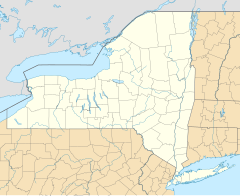Taughannock Falls State Park
| Taughannock Falls State Park | |
|---|---|

Taughannock Falls in Autumn 2003
|
|
| Location of Taughannock Falls State Park within New York State | |
| Type | State park |
| Location | 1740 Taughannock Blvd. Trumansburg, New York |
| Nearest city | Trumansburg, New York |
| Coordinates | 42°32′42″N 76°36′22″W / 42.545°N 76.606°WCoordinates: 42°32′42″N 76°36′22″W / 42.545°N 76.606°W |
| Area | 750 acres (3.0 km2) |
| Created | 1925 |
| Operated by | New York State Office of Parks, Recreation and Historic Preservation |
| Visitors | 434,090 (in 2014) |
| Open | All year |
| Website | Taughannock Falls State Park |
| Taughannock Falls | |
|---|---|

Taughannock Falls in spring 2012
|
|
| Location | Tompkins County, New York |
| Coordinates | 42°32′08″N 76°36′39″W / 42.5356°N 76.6108°W |
| Type | Plunge |
| Total height | 215 ft (66 m) |
| Number of drops | 1 |
| Watercourse | Taughannock Creek |
Taughannock Falls State Park (/təˈɡænək/) is a 750-acre (3.0 km2) state park located in the Town of Ulysses in Tompkins County, New York in the United States. The park is northwest of Ithaca near Trumansburg.
The park's namesake, Taughannock Falls, is a 215-foot (66 m) plunge waterfall that is the highest single-drop waterfall east of the Rocky Mountains.
The region surrounding Taughannock Falls State Park was home to the Cayuga people prior to their displacement from the area during the Clinton-Sullivan Campaign following the American Revolutionary War. Taughannock Creek was used as a source of power for mills and a gun factory in the early 19th century. In the 1870s, steamboats, railroads and Victorian hotels were built in the region to serve tourists who traveled to view the falls.
Taughannock Falls State Park was created in 1925 on a 64-acre (0.26 km2) parcel of land acquired by New York State. Roads and trails at the park were improved by the Works Progress Administration in the 1930s. The park has since grown to its current size of 750 acres (3.0 km2).
Several possible sources have been proposed for the name Taughannock, all of which describe Native American origins. One translation suggests that the name is derived from a combination of Iroquois and Algonquin terms meaning "great fall in the woods". An alternate theory suggests that the name may refer to a Lenni Lenape (Delaware) chief named Taughannock who died near the falls during a battle.
...
Wikipedia

